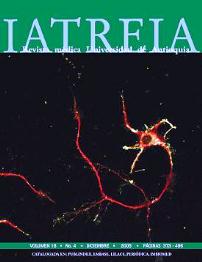Stem-cells transplantation for myocardial regeneration
DOI:
https://doi.org/10.17533/udea.iatreia.4247Keywords:
Angiogenesis, Cardiac failure, Cardiomyoplasty, Coronary disease, Stem cellsAbstract
Heart failure is a heterogeneous clinical syndrome that develops after an "index event" which damages cardiac tissue with loss of cardimyocytes and/or alteration of myocardial ability to generate an efficient ventricular contraction. The initial injury can appear suddenly as in the acute coronary syndrome or gradually as happens in chronic coronary arteries disease, and primary or secondary cardiomyopathies. Regardless of the etiologic factor, a series of hemodynamic alterations and neurohormonal responses with complex molecular changes is produced, leading to progression of ventricular dysfunction and to greater loss of contractile cells due to necrosis or apoptosis.
Therapeutic strategies developed so far to interrupt this vicious circle of myocardial dysfunction and ventricular remodeling, do change the conditions of myocardial work, improving the situation of patients and their survival probability. However, this therapeutic approach does not produce myocardial regeneration, and consequently, the disease may progress to terminal heart failure and death.
Experimental and clinical studies have revealed that implantation of bone marrow stem cells may produce angiogenesis and improve cardiac function in patients with acute or chronic ischaemic heart disease. It has been found that this therapy produces significant improvement of several parameters such as: symptoms, exercise capacity, functional state, size of the myocardial perfusion defect and ejection fraction; besides, there is a decrease in the end-systolic left ventricle volume.
The procedure is not associated with complications. In conclusion, bone marrow stem cells transplantation is an effective and safe form of therapy to promote neovascularization and improve myocardial perfusion and contractility in patients with acute or chronic ischaemic heart disease who are not appropriate candidates for standard revascularization therapies.
Downloads
Downloads
Published
How to Cite
Issue
Section
License
Papers published in the journal are available for use under the Creative Commons license, specifically Attribution-NonCommercial-ShareAlike 4.0 International.
The papers must be unpublished and sent exclusively to the Journal Iatreia; the author uploading the contribution is required to submit two fully completed formats: article submission and authorship responsibility.














